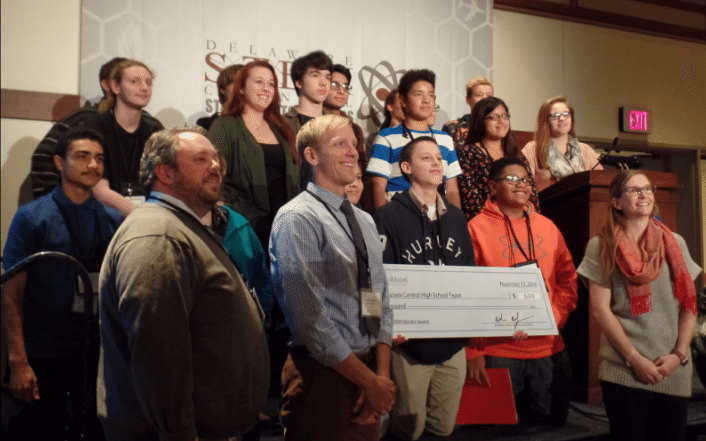Malcolm D’Souza found his way to science, technology, engineering and mathematics (STEM) through, of all things, cricket.
After spending a year in seminary, D’Souza, the son of a man who helped shovel coal on the steam engines of the Indian Railway and now associate dean of interdisciplinary/collaborative sponsored research at Wesley College, wound up getting his bachelor’s in chemistry from the University of Bombay. Then it was off to the U.S., arriving here 29 years ago at Northern Illinois University for grad school.
He knew no one at the time, and had no idea what, specifically, he was going to study. His parents had borrowed money for his plane ticket, and there was “no going back,” he said at the Delaware STEM Council’s third-annual STEM Symposium last week during Delaware Innovation Week 2016. He found his mentor, and thus his career in organic chemistry, through a shared love of the sport of cricket.
“I became an organic chemist because my mentor played cricket, and I could connect to him and he gave me a chance in his research group,” he said.
That’s what D’Souza said he does at Wesley College, which is 60 percent students of color. He gives students a chance, “irrespective of how they’re doing in school.”
The idea of giving everybody a chance to pursue a career in the STEM fields was the main topic of the panel discussion STEM Symposium, held last week at the University of Delaware’s Clayton Hall in Newark. The panel was hosted by Teri Quinn Gray, a DuPont chemist and the co-chair of the Delaware STEM Council. The symposium was followed by an awards ceremony. (We’re working on getting a list of winners.)
Topics during the panel ranged from how educators can improve ways of teaching STEM to their students to how to bring more youth into these fields.
The discussion of youth in STEM was enhanced by Victoria Chenyan Korbonis, an engineer in training at DuPont. The Villanova University graduate talked about what it is like to be young in a field that many of its members are older than 35.
Korbonis said she was the only person under 50, let alone 30, in her group when she began at DuPont, and that she found communication with her peers difficult due to their ages until she figured out that if she was proactive, she could communicate with them.
“I thought they didn’t want to talk to me. Maybe the work I do is not important, maybe I’m just a pair of hands,” Korbonis said. “But what I realized was that it’s not them who purposely ignore me, it’s me feeling the difference, feeling that I’m not experienced, so me feeling that difference kept me quiet, so then I decided, ‘This has to stop,’ so I volunteered to give a presentation and they were fascinated by my work.”
Most of the discussion, however, revolved around getting minorities into STEM fields. It has been projected that STEM jobs will have increased 17 percent between 2008 and 2018, Gray said, and that 51 percent of the nation’s public school students are non-white. Despite this, the STEM landscape has hardly changed in terms of minorities getting involved, with 1.68 million out of a possible 5.64 million jobs in STEM fields going to minorities, according to a 2015 study by the National Science Foundation.
Donald Baker, CEO of the Forum to Advance Minorities in Engineering (FAME), a nonprofit designed to help encourage minorities into the STEM fields, said he thinks that if people used diversity as a way to solve problems, minorities might be focusing on STEM careers.
“We don’t respect others’ journeys, we really don’t, and we don’t appreciate what this culture has to offer or what that culture has to offer,” Baker said. “I said this in a video for FAME’s 40th anniversary, ‘You can never discount what a problem solver looks like’ because the journeys that are different lead to different ways to solve a problem.”
Using the upcoming film Hidden Figures, which is about the three African-American women mathematicians who helped NASA in the Space Race, as an example, Carol Henderson, professor of English and Black American studies at the University of Delaware, said talking about people’s culture and how it relates to STEM might get people interested in studying.
“The other thing I think we need to do is tell the complete story of people’s identities and cultural backgrounds,” Henderson said. “America’s history has not been an inclusive history, and the STEM field has not told the complete story of all scientists.”
Karl Booksh, a professor of chemistry at the University of Delaware, said equality in STEM must not only be based on giving people chances and fostering diversity, but also must be accomplished by giving people expectations on which to grow and succeed.
“You have to have the right expectancies, either naturally in you or instilled in you before you see yourself as a success,” Booksh said. “You can have all those other pieces all lined up, but if you can’t envision you as a success it’s not going to happen.”
Overall, Gray said the future of STEM starts at home by giving kids encouragement to learn and build the basics needed for success.
“As families and communities encourage our kids to get the fundamentals around the basics and reading and comprehension and a strong mathematics background, that foundation in elementary and middle school will set the stage for them to do almost everything they need to do to access STEM-related curricula and opportunities,” Gray said.
History has ‘not told the complete story of all scientists’: Leaders talk equality in STEM







